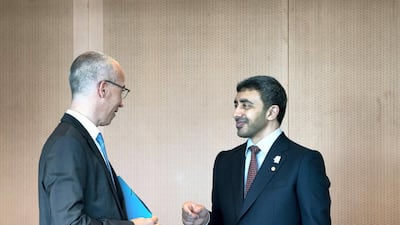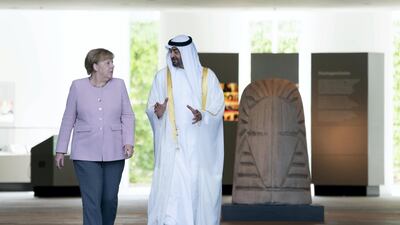Angela Merkel. the German chancellor, took the opportunity to embrace the UAE Year of Tolerance during the official visit of Sheikh Mohamed bin Zayed this week.
The Crown Prince of Abu Dhabi and Deputy Supreme Commander of the Armed Forces arrived home on Thursday from a two-day trip to Berlin in which the highlight was a joint statement that rolled over the 15-year strategic partnership between the two states.
The visit also highlighted the importance of jointly appointed special envoys in promoting strong bilateral exchanges in future.
Mrs Merkel said the ties went far beyond strong economic links and the one million Germans that visited the UAE every year. She said the Year of Tolerance and the visit of Pope Francis to Abu Dhabi in February was a demonstration of the state's wider influence.
"I would like to emphasise – and this is very important to us – the tolerance initiative of the Emirates," she said. "At the beginning of the year, the first pope's visit to the Arabian Peninsula took place within this framework. The fact that the Special Olympics were hosted by the United Arab Emirates also shows that all population groups should be involved. These Special Olympics were a great success.
"We talked about the importance of building bridges across different religions and denominations, as well as between neighbours, given the conflicts in the region. Extremism and hatred must be resolutely opposed to tolerance and friendship between peoples. Of course, this includes the fight against international terrorism."
Talks that extended through a working dinner also touched on tensions and conflicts in the region, including Iran, Syria and Yemen.
"I am very glad that in our joint statement we agreed that there is a need to support the process initiated by the United Nations with the Special Envoy as well," she said of the peace efforts in Yemen. "Small successes can be seen but unfortunately we are still a long way from resolving the conflict."
On Iran, the German leader said the 2015 nuclear deal was one consideration among others. "Even if the United Arab Emirates and Germany sometimes have slightly different points of view, we are united by the desire to find peaceful solutions," she said. "We have recently had a lot of exchanges on this. It has to be said that there are activities of Iran – for example the ballistic missile programme or even some activity in Syria – that of course concerns us."
For his part Sheikh Mohamed underlined the long-term nature of the relationship and how both sides wished to invest in an expanded partnership.
''I am extremely happy to be here in Germany as we are celebrating the 15th anniversary of signing our Strategic Partnership Agreement," Sheikh Mohamed said.
"The trade exchange at that time was $3 billion and now it is close to $14bn. Our visit to Germany confirms that we have a new road map for another 15 years.
"We are looking forward to double our trade exchange. We have discussed a variety of issues and we agree on many of them. We hope to see our bilateral relations and co-operation getting stronger."
Mrs Merkel warmly welcomed the visit of the Abu Dhabi Crown Prince to Berlin as a continuation of his last trip in 2016 and her visit to the UAE in 2017.
She said the talks with Sheikh Mohamed tackled a wide range of bilateral issues, most notably the celebration of the 15-year strategic partnership between the two countries.
''Our talks today underscore our commitment to deepen our bilateral ties, a goal clearly accentuated by the Joint Statement issued on Wednesday on 'Advancing towards a more Comprehensive Strategic Partnership between the United Arab Emirates and the Federal Republic of Germany'."

















